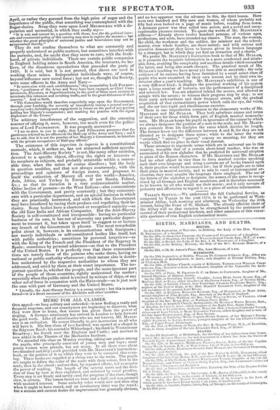MUSIC FOR ALL CLASSES.
Otis appeal—so long solitary and unheeded—is now finding a ready and frequent response, and our countrymen are beginning to discover, what they were slow to learn, that nature has given them the power of singing. A German missionary has arrived in London to help forward the good work. Like all missionaries who are not knaves, Mr. MAINT- ZER is an enthusiast. He comes liberally to give instruction to all who will have it. His first class, of two hundred, was opened at a chapel in the Edgware Road ; his second in Whitechapel ; his third in Westminster Broadway ; his fourth near the Elephant and Castle ; and another is now added in the Theatre of the Mechanics Institute.
We attended this class on Monday evening, taking our station among the pupils, who principally consisted of young men and boys ; some young women were present, but not many. In all there were about two hundred and fifty ; each provided with Mr. MAINTZER'S instruction- book, or the portion of it on which they were to be occupied that even- ing. These books are supplied at a cheap rate in the room. The pupils are taught to follow the order of the notes with their voices, first in the scale, then in the chord ; and are thus, by repeated efforts, led to acquire the power of reading. The length of the several notes and the divi- sion of time by bars is then explained, and enforced by vocal practice. Every step is set firmly and surely ; and the progress of the class, though slow, is certain. The lesson lasted an hour and a half, and was pursued with unabated interest. Some unlucky voice would now and then sing 'when it ought to have rested, and an involuntary titter was the result ; but a serious and earnest desire for improvement was generally obvious, and no less apparent was the advance in this, the third lesson. Here were two hundred and fifty men and women, of whom probably not fifty had even looked on a page of music before, reading from notes. A dormant power was thus called into action, and a novel and unex- ceptionable pleasure created. To quote the words of Mr. MAINTZER'S address—" Already above twelve hundred persons, of various ages, professions, and sects, have attended my classes. The man, the woman, the child, the workman and the soldier, the minister and the school- master, even whole families, are there united; and with serious and attentive demeanour .they listen to lessons given in broken language by a stranger, but in which they yet find an attraction and a charm. We prefer Mr. MAINTZER'S Instruction-book to that of Mr. Huixerr, as it presents the requisite information in a more condensed and attain- able form, avoiding the complexity and needless details which encumber the latter, and being also much cheaper. The practical result of Mr. Hum-Lies teaching we have never yet been able to ascertain ; the only evidence of its success having been furnished by a small select class of pupils who were examined in their own lessons and by their own in- structor after a year's teaching. Mr. MAINTZER'S exhibition is one of a very different kind: it displays the practical working of his system upon a large number of learners, not the performance of a disciplined and selected few. You are admitted behind the scenes, and allowed to mingle with the actors ; to witness their progress step by step ; to see their early awkwardness and their frequent errors, and the gradual acquisition of that extraordinary power which calls the eye, the voice, and the ear into rapid and simultaneous exercise.
There is one imperfection common to the elementary works of Mr. MAINTZER and Mr. HULLAH. They both substitute names and terms of their own for those which form part of English musical nomencla- ture. Mr. HULLAH keeps his pupils in ignorance of the names by which we always designate the position of a note in the scale, and Mr. Mmwr- zza conceals from his disciples the name which decides its length. The former know not the difference between A and B, for they are not directed so to designate these notes ; while to the latter the words "crotchet," "minim," "quaver," convey no meaning, for they are words which find no place in their vocal manual. These attempts to supersede terms which are in universal use in this country, resemble that of a certain short-hand teacher, who was so enamoured of his new alphabet that he predicted its universal adoption in place of the Roman characters. If Mr. MAINTZER and Mr. HULLAM had no other object in view than to form musical coteries speaking each their own language and using a certain set of books framed upon it, their practice would be accounted for ; but if their pupils are to take their place in musical society, and to mix in vocal or instrumental or- chestras, they must acquire the language there employed. The use of the letters of the alphabet to designate the names of the notes is recog- nized by all German and English musicians, and is therefore necessary to be known by all who would use their music ; and it only savours of pedantry and affectation to regard it as a piece of useless information.
TALLIS'S SERVICE.—We understand the full Cathedral Service, as composed by TALUS in the year 1570, is to be performed at West- minster Abbey, both morning and afternoon, on Wednesday the 29th instant, being the Feast of St. Michael. The already efficient choir of the Abbey will on that occasion be strengthened by the assistance of several of their professional brethren, and other amateurs of this vener- able specimen of true English ecclesiastical music.


























 Previous page
Previous page